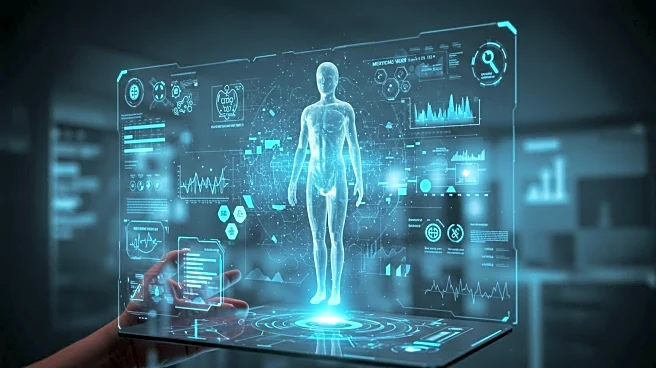What is the story about?
What's Happening?
Digital Twin (DT) technology is emerging as a transformative tool in healthcare, offering potential advancements in public health preparedness. DT technology involves creating digital replicas of physical entities, which can be used for prognostic analytics, personalized treatment, and interdisciplinary coordination. The technology is still in its early stages, but it promises to revolutionize healthcare by enabling dynamic predictive models that anticipate health issues and disease trends. These models can inform prevention and treatment strategies, providing personalized healthcare solutions. Additionally, DT technology can enhance medical training by offering interactive environments for skill development. Despite its potential, DT technology faces challenges such as high development costs, ethical considerations, and regulatory compliance.
Why It's Important?
The integration of DT technology in healthcare could significantly impact public health by improving disease management and personalized treatment. It offers a proactive approach to healthcare, potentially reducing the burden on healthcare systems by predicting and preventing diseases before they escalate. This technology could democratize access to advanced healthcare solutions, although initial costs may limit accessibility. Ethical and regulatory challenges must be addressed to ensure patient privacy and data security. The successful implementation of DT technology could lead to more efficient healthcare delivery, improved patient outcomes, and reduced healthcare costs, benefiting both patients and healthcare providers.
What's Next?
Future developments in DT technology will focus on overcoming scalability challenges and enhancing interdisciplinary collaboration. Researchers and developers will need to address ethical and regulatory issues to ensure the technology is used responsibly. As DT technology evolves, it may become a standard tool in healthcare, offering comprehensive solutions for disease management and personalized treatment. Stakeholders, including governments and healthcare organizations, will play a crucial role in supporting the development and integration of DT technology into healthcare systems.
Beyond the Headlines
The broader implications of DT technology extend beyond healthcare, potentially impacting areas such as animal welfare and conservation. By facilitating experimentation on digital models, DT technology could contribute to advancements in these fields. Additionally, the technology's ability to predict and combat infectious diseases highlights its potential in global health security. As DT technology becomes more sophisticated, it may offer solutions to complex societal challenges, such as climate change and resource management.















